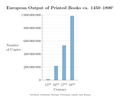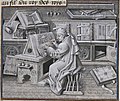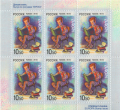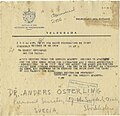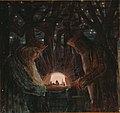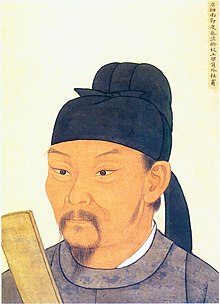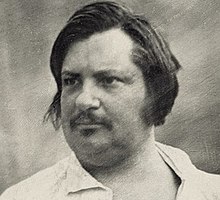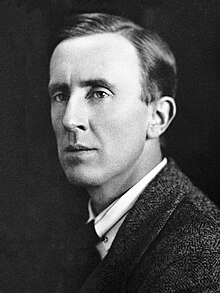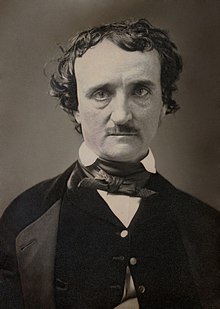Portal:Literature
Introduction

Literature is any collection of written work, but it is also used more narrowly for writings specifically considered to be an art form, especially novels, plays, and poems. It includes both print and digital writing. In recent centuries, the definition has expanded to include oral literature, much of which has been transcribed. Literature is a method of recording, preserving, and transmitting knowledge and entertainment. It can also have a social, psychological, spiritual, or political role.
Literary criticism is one of the oldest academic disciplines, and is concerned with the literary merit or intellectual significance of specific texts. The study of books and other texts as artifacts or traditions is instead encompassed by textual criticism or the history of the book. "Literature", as an art form, is sometimes used synonymously with literary fiction, fiction written with the goal of artistic merit, but can also include works in various non-fiction genres, such as biography, diaries, memoirs, letters, and essays. Within this broader definition, literature includes non-fictional books, articles, or other written information on a particular subject. (Full article...)
General images -
The Man in the Moone is a book by the English divine and Church of England bishop Francis Godwin (1562–1633), describing a "voyage of utopian discovery". Initially considered to be one of his early works, it is now generally thought to have been written in the late 1620s. It was first published posthumously in 1638 under the pseudonym of Domingo Gonsales. The work is notable for its role in what was called the "new astronomy," the branch of astronomy influenced especially by Nicolaus Copernicus, the only astronomer mentioned by name, although the book also draws on the theories of Johannes Kepler, William Gilbert, and Galileo Galilei.
The work tells the story of Gonsales, a Spaniard who discovers a species of wild swan able to carry substantial loads, the gansa, and contrives a device that allows him to harness many of them together and fly around an island, and eventually, to the moon and back.
Some critics consider The Man in the Moone, along with Kepler's Somnium, to be one of the first works of science fiction. Although the book was well known in the 17th century, and even inspired parodies by Cyrano de Bergerac and Aphra Behn, modern literary critics do not consider it to be very important.
Selected excerpt
| “ | The most merciful thing in the world, I think, is the inability of the human mind to correlate all its contents. We live on a placid island of ignorance in the midst of black seas of infinity, and it was not meant that we should voyage far. The sciences, each straining in its own direction, have hitherto harmed us little; but some day the piecing together of dissociated knowledge will open up such terrifying vistas of reality, and of our frightful position therein, that we shall either go mad from the revelation or flee from the deadly light into the peace and safety of a new dark age. | ” |
| — H. P. Lovecraft, The Call of Cthulhu | ||
More Did you know
- ... that although J. R. R. Tolkien translated the Old English poem Beowulf in the 1920s, he did not like the result so it was published only posthumously in 2014 as Beowulf: A Translation and Commentary?
- ... that the 1928 Hindi novel Nirmala uses fiction to promote social reform of the dowry system in India?
- ... that although Crown Duel's fictional setting of Sartorias-deles is most like New Zealand, its customs and fashions were inspired by the court of Louis XIV?
- ... that Crown Princess Yaza Datu Kalaya is the subject of some of the "most beautiful poems in Burmese literature" by her nephew and husband Natshinnaung?
- ... that as a young girl, Margaret George became interested in Cleopatra because they both had dark hair, and later wrote a best-selling novel about her?
Selected illustration
Did you know (auto-generated) -

- ... that despite a career writing queer literature, Chen Xue's 2019 novel Fatherless City had a "putatively straight premise"?
- ... that Hammersmith by Gustav Holst was acclaimed by Frederick Fennell for having "some of the most treacherous stretches of music making" in band literature?
- ... that Cathie Dunsford was unable to find many books about lesbianism in the 1970s, but by the 1980s had herself become a writer and anthologist of lesbian literature?
- ... that the poet Fernando Pessoa considered Alberto Caeiro, one of his own heteronyms, to be his master?
- ... that the Lviv branch of the Ukrderzhnatsmenvydav was the main publisher of Polish literature in the Soviet Union by 1941?
- ... that the literary magazine Adabijoti Soveti was the sole remaining publication in the Jewish-Bukharian language by the time of the switch to the Cyrillic script in 1939–1940?
Today in literature
- 1865 - Mark Twain's story The Celebrated Jumping Frog of Calaveras County is published in the New York Saturday Press.
- 1874 - Clarence Day, American author born
- 1889 - William Allingham, Irish author died
- 1906 - Klaus Mann, German writer born
- 1922 - Marcel Proust, French novelist died
- 1926 - George Bernard Shaw refuses to accept the money for his Nobel Prize, saying, "I can forgive Alfred Nobel for inventing dynamite, but only a fiend in human form could have invented the Nobel Prize."
- 1939 - Margaret Atwood, Canadian writer (Surfacing, The Handmaid's Tale) born
- 1941 - Émile Nelligan, Quebec poet died
- 1946 - Alan Dean Foster, American author born
- 1952 - Paul Eluard, French poet died
- 1957 - Seán Mac Falls, Irish-born poet born
- 1966 - Jorge Camacho, Spanish poet born
- 1985 - Calvin and Hobbes, a comic strip by Bill Watterson, is first published.
- 1999 - Paul Bowles, American novelist died
Topics
| Literature: | History of literature · History of the book · Literary criticism · Literary theory · Publishing |
| By genre: | Biography · Comedy · Drama · Epic · Erotic · Fable · Fantasy · Historical fiction · Horror · Mystery · Narrative nonfiction · Nonsense · Lyric · Mythopoeia · Poetry · Romance · Satire · Science fiction · Tragedy · Tragicomedy · more... |
| By region: | African literature · Asian · European · Latin American · North American · Oceanic |
| By era: | Ancient literature · Early medieval · Medieval · Renaissance · Early Modern · Modern |
| By century: | 10th century in literature · 11th · 12th · 13th · 14th · 15th · 16th · 17th · 18th · 19th · 20th · 21st |
| Recent: | 2018 in literature· 2017 · 2016 · 2015 · 2014 · 2013 · 2012 · 2011 · 2010 · 2009 · 2008 · 2007 · more... |
Categories
Related portals
| Concepts: | |
| Genres: | |
| Religions: |
Things you can do
Related WikiProjects
WikiProjects related to literature:
| Concepts: | Biographies · Books · Comics · Magazines · Manga · Novels · Poetry · Short stories · Translation studies |
| Genres: | Alternate history · Children's literature · Crime · Fantasy · Horror · Mythology · Romance · Science fiction |
| Authors: | Honoré de Balzac · Roald Dahl · William Shakespeare |
| Series: | Artemis Fowl · Chronicles of Narnia · Discworld · Harry Potter · His Dark Materials · Hitchhiker's Guide to the Galaxy · Inheritance Cycle · James Bond · King Arthur · Middle-earth · Percy Jackson · Redwall · A Series of Unfortunate Events · Shannara · Sherlock Holmes · A Song of Ice and Fire · Star Wars · Sword of Truth · Twilight · Warriors · Water Margin · Wizard of Oz |
| Regions: | Australian literature · Indian literature · Persian literature |
Associated Wikimedia
The following Wikimedia Foundation sister projects provide more on this subject:
-
Commons
Free media repository -
Wikibooks
Free textbooks and manuals -
Wikidata
Free knowledge base -
Wikinews
Free-content news -
Wikiquote
Collection of quotations -
Wikisource
Free-content library -
Wikiversity
Free learning tools -
Wiktionary
Dictionary and thesaurus










